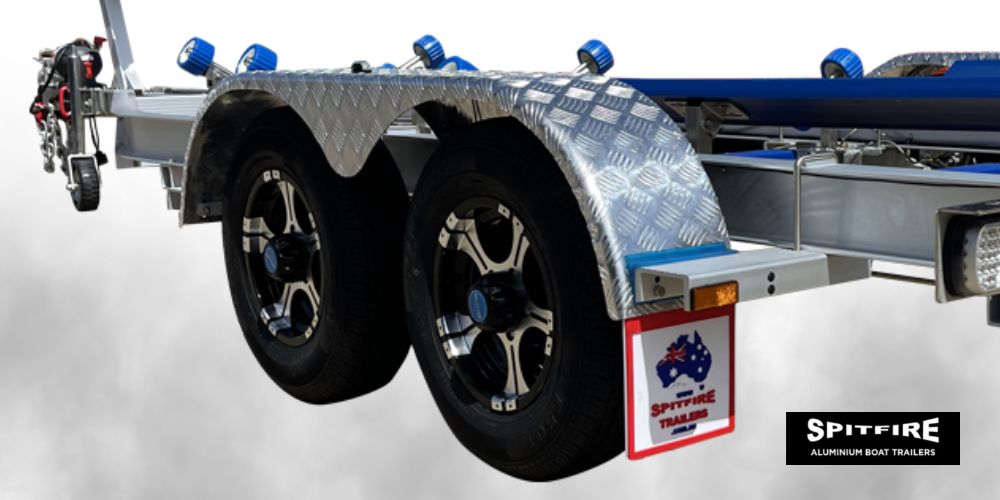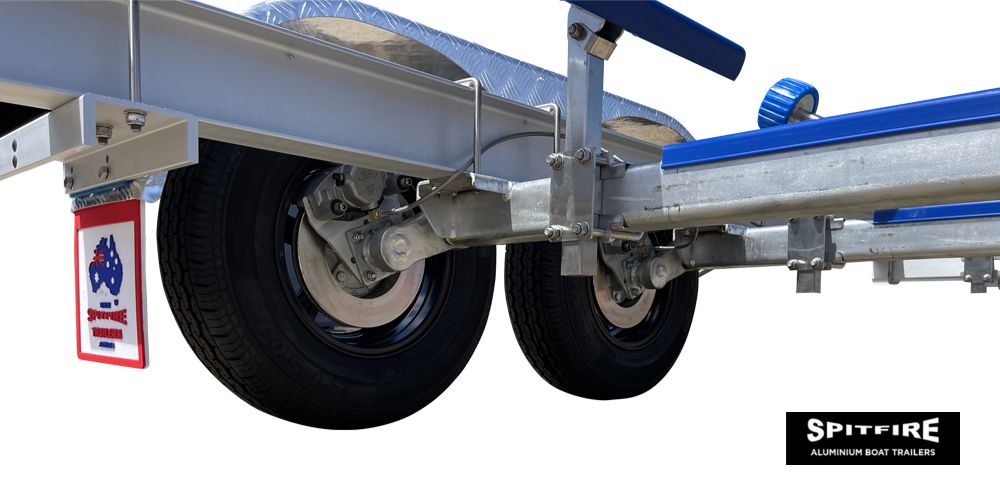Spitfire Boat Trailers
What’s the Perfect Boat Trailer Tyre Pressure?
Ensuring the perfect tyre pressure for your boat trailer is critical for safe towing, prolonging tyre life, and protecting your boat from potential damage. Incorrect tyre pressure can lead to increased wear and tear, compromised handling, and even blowouts. In this article, we’ll provide you with a detailed guide on determining and maintaining the ideal tyre pressure for your boat trailer.
The Perfect Boat Trailer Tyre Pressure
1. Check the Manufacturer’s Recommendations
Every trailer tyre comes with a recommended pressure range, typically printed on the sidewall. This value, known as the maximum cold inflation pressure, indicates the pressure when the tyre is cold, not after driving.2. Consider the Load Capacity
The weight of your boat and trailer combined plays a significant role in determining tyre pressure. Overloading tyres beyond their capacity can cause premature failure. Check your trailer’s Gross Vehicle Weight Rating (GVWR) and ensure your tyres are inflated to handle the load. Divide the total load by the number of tyres to determine the per-tyre load.3. Adjust for Environmental Factors
Temperature fluctuations can significantly impact tyre pressure. For every 10°F change in temperature, tyre pressure can increase or decrease by 1 PSI. When towing in hot weather, it’s critical to measure and adjust tyre pressure early in the morning before the tyres heat up.
Why Tyre Pressure Matters for Boat Trailers
Maintaining the correct tyre pressure is essential for several reasons:
- Safety: Properly inflated tyres ensure optimal handling and reduce the risk of accidents.
- Tyre Longevity: Underinflated or overinflated tyres wear out unevenly, reducing their lifespan.
- Fuel Efficiency: Correct tyre pressure minimizes rolling resistance, improving fuel economy during towing.
- Protecting the Load: Proper tyre pressure ensures the trailer remains level, protecting your boat from undue stress.
Steps to Measure and Adjust Tyre Pressure
1. Use a High-Quality Tyre Pressure Gauge
Invest in a reliable gauge, preferably a digital one, for precise readings. Avoid relying on visual inspections, as they are inaccurate.2. Check Tyre Pressure When Cold
Always measure pressure before towing or after the trailer has been stationary for a few hours. Warm tyres give higher readings, which can lead to under-inflation if adjustments are made incorrectly.3. Inflate or Deflate as Needed
Using an air compressor, add air until the tyres reach the recommended pressure. To deflate, press the valve stem gently and monitor the pressure.Signs of Incorrect Tyre Pressure
Underinflated Tyres
- Excessive wear on the outer edges of the tread
- Increased rolling resistance, leading to higher fuel consumption
- Higher risk of blowouts due to overheating
Overinflated Tyres
- Wear concentrated in the centre of the tread
- Reduced traction and a bumpier ride
- Increased susceptibility to impact damage
FAQs About Boat Trailer Tyre Pressure

1. How often should I check my boat trailer tyre pressure?
You should check tyre pressure before every trip, especially for long journeys. Regular checks help avoid unexpected issues on the road.
2. Can I use the same tyre pressure rules as my car tyres?
No, trailer tyres are designed for heavier loads and require higher pressure than car tyres. Always follow the pressure recommendations printed on the tyre sidewall.
3. What happens if my tyres are underinflated?
Underinflated tyres wear out faster on the edges, generate more heat, and are more likely to fail during towing. They also make towing less fuel-efficient.
4. What are the risks of overinflating my boat trailer tyres?
Overinflated tyres wear more in the centre, reduce traction, and make the ride bumpier. They are also more prone to damage from impacts like hitting a pothole.
Conclusion
Maintaining the perfect boat trailer tyre pressure is crucial for safe and efficient towing. By following the manufacturer’s recommendations, considering the load capacity, and routinely checking tyre pressure, you can avoid common pitfalls like blowouts or uneven tyre wear. A well-maintained boat trailer not only ensures the safety of your boat but also provides peace of mind on the road.
Ready to ensure your trailer is in top condition? At Spitfire Trailers, we offer comprehensive maintenance services to keep your boat trailer performing at its best. Plus, if you’re in the market for a new trailer, explore our range of high-quality anodised aluminum boat trailers. Contact us today or visit our showrooms in Townsville, and Brisbane to find the perfect boat trailer for your needs.
